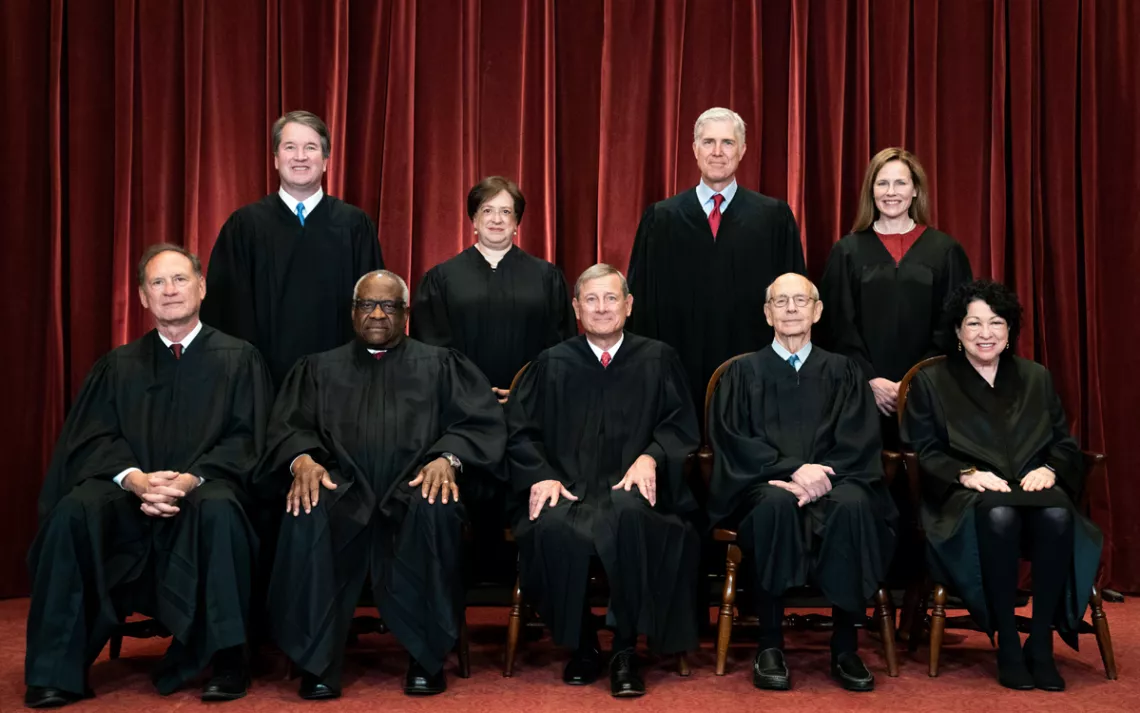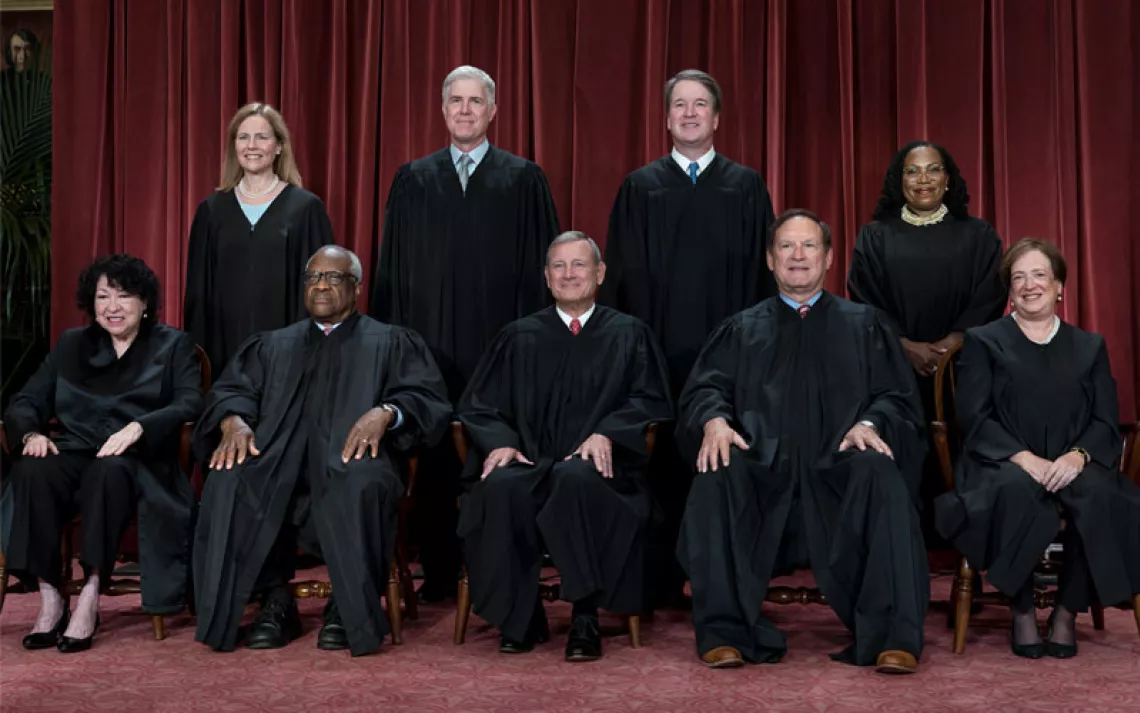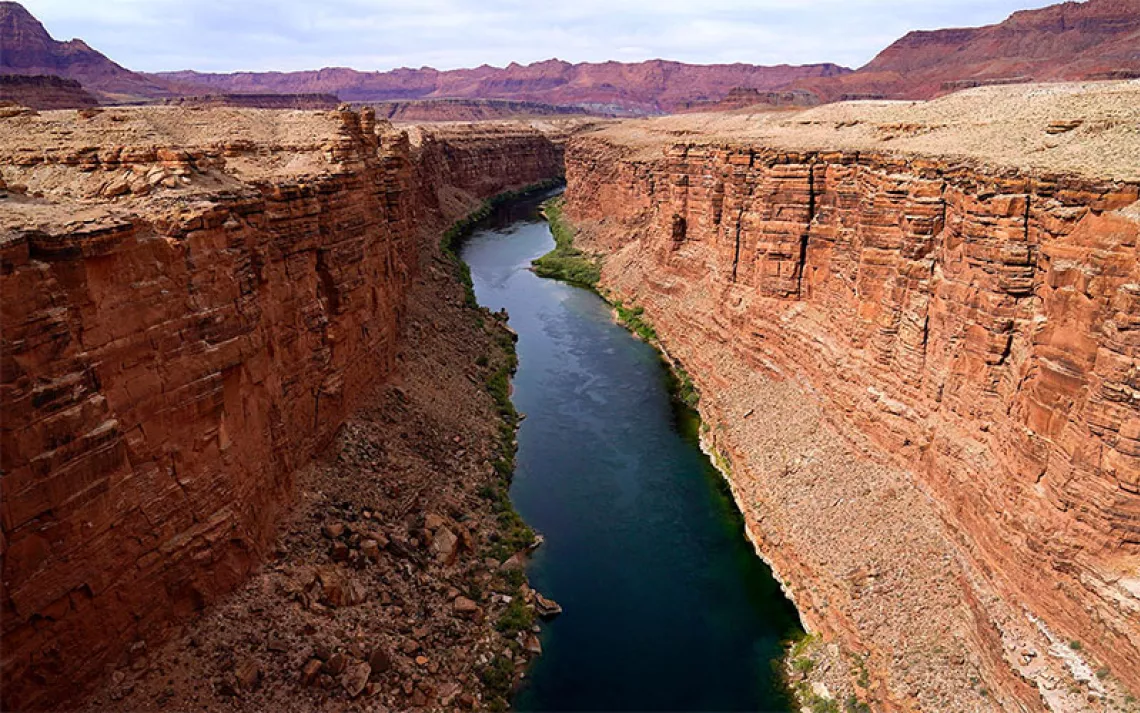The Supreme Court Strikes Again
In a 6–3 ruling, justices dramatically limit the EPA’s authority to reduce carbon pollution from power plants

Photo by Erin Schaff/The New York Times via AP
The Supreme Court on Thursday continued the conservative majority’s long-standing effort to shackle the federal government’s ability to safeguard public health and welfare, voting to curtail the Environmental Protection Agency’s authority to regulate the carbon pollution that is heating up the planet.
The ruling came in West Virginia v. EPA, a case brought by a group of Republican attorneys general who claimed that the Obama-era Clean Power Plan exceeded the agency’s authority to reduce pollution from the electric power sector. Writing for the six-justice majority, Chief Justice John Roberts agreed and concluded that “it is not plausible that Congress gave EPA the authority to adopt” regulations to shift the utilities from coal-fired power plants toward cleaner, renewable energy.
That’s the immediate bad news from the West Virginia v. EPA decision, and it’s bad enough. With this decision, the federal government has lost one of the most effective tools for making meaningful cuts in carbon pollution from existing power plants.
“This decision gives coal executives and far-right politicians exactly what they asked for, by frustrating EPA’s efforts to set strong, effective carbon pollution standards from power plants that would help protect our communities and families,” said Andres Restrepo, a senior attorney for the Sierra Club’s Environmental Law Program. “To address the worst effects of climate change, we need to go a lot further and a lot faster. Which is why today’s decision is a real setback.”
The good news, such as it may be, is that the court didn’t go so far as to completely strike down the EPA’s authority to regulate greenhouse gas emissions, as some feared it would. The agency retains the ability—and the legal obligation—to put in place power-plant-specific controls on carbon pollution, to regulate methane emissions from oil and gas equipment, and to curtail tailpipe emissions from cars and trucks, among other things. “This [decision] does confirm that the EPA has authority to set standards for coal and gas plants’ power emissions,” said Natural Resources Defense Council attorney David Doniger. “That’s a significant authority, and we will be pressing for EPA to use that authority to set new standards.”
David Bookbinder, a veteran environmental attorney who is chief counsel at the Niskanen Center, a right-of-center think tank, described the decisions as “the narrowest possible bad thing they could’ve done.”
But Bookbinder—along with other environmental lawyers and Supreme Court observers—also expressed deep worry over how Chief Justice Roberts’s decision treated what’s called “the major questions doctrine.” That doctrine covers how—or even whether—executive agencies like the EPA are able to establish regulations that may have significant social or economic implications for the country as a whole. In the last year, the major questions doctrine has been cited in decisions to strike down COVID-19 vaccine mandates and rules requiring masks on airplanes, and it was also at the center of Roberts’s logic in the EPA case.
“So, yeah, this is trouble,” Bookbinder said. “The majority said, ‘If we decide something is a big and important issue, we will read the agency authority narrowly.’”
Writing on Twitter, Harvard Law School professor Jody Freeman said the court’s “embrace of the Major Questions Doctrine [is] ominous.”
The three justices in the minority had sharp words about the majority’s invocation of this relatively recent doctrine. In her dissent, Justice Elena Kagan declared that the court had improperly insinuated itself into an issue that could just as well have been handled by Congress and the EPA, to which it had delegated some of its authority. “The majority today overrides . . . legislative choice. In so doing, it deprives the EPA of the power needed—and the power granted—to curb the emission of greenhouse gases.”
Kagan concluded: “The Court today prevents congressionally authorized agency action to curb power plants’ carbon dioxide emissions. The Court appoints itself—instead of Congress or the expert agency—the decision-maker on climate policy. I cannot think of many things more frightening.”
Kagan’s dissent points to what, in the long run, will likely be the most troubling aspect of the court’s decision in West Virginia v. EPA. The conservative supermajority is not just limiting the EPA’s ability to address climate change, what Kagan calls “the most pressing environmental challenge of our time.” By elevating the idea of the major questions doctrine, the conservative justices are also inviting challenges to a broad range of federal regulations that could include everything from food safety rules to consumer protections meant to safeguard people from financial fraud.
The decision “will embolden opponents of agency regulations to challenge any agency action they don’t like and claim it’s a major question,” the Sierra Club’s Restrepo said. “Badly needed safeguards protecting public health and welfare will be held hostage to whether it’s a ‘major question.’”
“This is really, really big,” said Karen Sokol, a professor at Loyola University New Orleans College of Law. In her analysis, the Roberts opinion performs a rhetorical “sleight of hand.” It insists it is a “narrow” decision focused on an interpretation of one subsection of the Clean Air Act. But by resting so heavily on the major questions doctrine, it is, in fact, a possibly landmark decision that expands the court’s authority. “This is the court wrapping itself in the guise of humility when actually it’s the one making the policy here.”
Such judicial activism is likely to forestall progress on a range of pressing issues. Congress, after all, is all but paralyzed; it can barely pass new laws, much less forward-looking ones that delegate specific powers to the executive agencies. In the absence of such explicit delegation of powers, some federal courts—now packed with conservative Trump appointees—are likely to use the major questions standard to knock down all sorts of public interest laws. Today’s decision, then, is a template for federal government inaction.
For the conservative movement, this has been the plan all along. The majority opinion in the EPA case is the latest victory in a 50-year-long effort to dismantle what conservatives call “the administrative state”—what most people simply think of as modern, effective government. The effort began in the early 1970s with the so-called “Powell Memo,” in which soon-to-be Supreme Court justice Lewis Powell argued that to protect American capitalism from “broad attack,” corporate interests needed to increase their influence over the judicial system. During the subsequent decades, a network of free-market fundamentalist organizations like the Federalist Society, the Koch brothers–funded Competitive Enterprise Institute, and the Republican Attorneys General Association put that plan into action. Today, the federal judiciary is more hostile to federal oversight of industry than at any time since the New Deal reforms of the 1930s.
By establishing the major questions doctrine as a new standard for the constitutionality of executive rulemaking, the Supreme Court has delivered “a ginormous gift to industry,” Sokol said. “Every agency regulation that is meaningful—that is protective of public health and safety—could raise a major question. This is hobbling agencies, and it’s empowering industry.”
That triumphant industry, of course, is exactly who funded the organizations like the Federalist Society that got the conservative justices on the court. "This majority was constituted by corporate power, including fossil fuel industry power," Sokol said. "In West Virginia v. EPA, these justices did what they were put on the court to do: seal in significant constitutional protections for corporate interests at the expense of the public—and, in the case of climate protection, the rest of the world.”
 The Magazine of The Sierra Club
The Magazine of The Sierra Club



